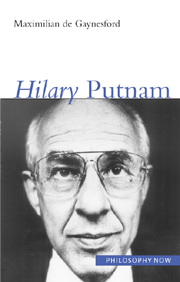14 - Experience
from Part IV - Content: later perspectives
Summary
This is typical of the release from metaphysical terrors: they leave little behind them when they disappear, because we can see, after they have gone, that what they threatened is not only unreal but unintelligible.
Bernard Williams, Shame and Necessity (1993: 152)Putnam's emerging account of intentionality brought him, as we have seen, to revise his conception of truth. He made surface changes of formulation and changes of emphasis over this period, but the deep idea remained constant. Truth is not correspondence with states of affairs whose nature and existence are independent of minds. More specifically, it is constrained by those mental phenomena involved in conditions on knowing things. This is the exemplary instance of Putnam's awareness of his overall redirection in this period: “I have come to see that one cannot come to grips with the real problems in philosophy without being more sensitive to the epistemological position of the philosopher” (Putnam 1983a: vii).
Epistemic constraints
The claim that we need to accommodate various ways in which our conception of truth is epistemically constrained follows from definitions like the following, which Putnam endorsed for a time: “Truth … is some sort of (idealized) rational acceptability – some sort of ideal coherence of our beliefs with each other and with our experiences as those experiences are themselves represented in our belief system” (Putnam 1981a (iii): 49–50). On this view, a belief that is rationally acceptable in epistemically satisfactory circumstances is true: there is nothing more to be added to it, no gap to close before truth itself is reached (Putnam 1979b: 167; 1983a: xviii; 1983d: 85).
- Type
- Chapter
- Information
- Hilary Putnam , pp. 164 - 177Publisher: Acumen PublishingPrint publication year: 2006



